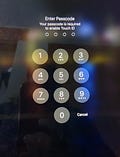What I Know: Secrets to Logging In and Unlocking
Partnering 101: A Deep Dive Into Leaving Kindly (4 of 10)
Get ready!
Welcome back to Partnering 101: A Deep Dive into Leaving Kindly, the second series in Life Cheat Sheets. This week’s date night will challenge you to begin sharing login information. Do you know your smartphone password by memory? Does your partner know your smartphone password by memory? If you were suddenly incapacitated and unable to communicate, would your partner know how to login to your phone for vital information such as particular contacts? Here is where we wade into the waters of trust and vulnerability. If your devices are off limits to your partner, now is the time to communicate how to make those devices available if ever necessary. So, find your comfy sharing spot, and settle in with your date as we dive into “What I Know: Secrets to Logging In and Unlocking.”
Get set!
Grab your partner and a notepad or print two copies of the worksheet (purple buttons). Click on the PDF version for a printable document or the Google doc if you prefer to work online. You will need to copy the Google document first in order to write on it. Once you are settled in it will be time to get to work. Plan for 30 minutes of shared time. If you have a place where you already keep login information, grab that document or device, too.
Go!
How many devices do you own? How presently open with your spouse or partner are you about your personal devices and access to accounts? In my case my husband and I already know how to login to each other’s phones and computers. However, I don’t have access to his ATM code. So if for some reason I would need that, I wouldn’t have a clue. I know when my sister’s husband was dying of cancer she became quite concerned that she needed access to so much information found only on his computer. Here is a quick challenge for you and your partner. See if you accurately know the following:
1) Your partner’s phone unlock code.
2) Your partner’s home computer and/or work computer login.
3) Your partner’s ATM passcode.
4) Where your partner keeps important keys (car, boat, home, lock box, storage units).
How did you do? Check with each other. A simple yes or no is fine. Discuss your results.
Read the three tips that follow. Then, each partner should fill out their own worksheet (by clicking on the purple buttons above). Together determine how and when this valuable information can and will be shared.
Don’t worry. In a future newsletter, we will dive into specific usernames and passwords for your online world. But for now, we simply want your partner to be able to open the devices themselves if/when needed.
Communication Tips
Tip 1: Recognize what you do today may be changed tomorrow. How will you be sure your partner always has access to the most recent login information? In our case, my husband and I have shared where we keep our updated codes and passwords. If necessary, think outside the box. Will another person have that information, like a sibling or a best friend? Will it be stored somewhere else? (Sort of the way we used to give an extra house key to the next door neighbor just in case we needed it?)
Honor where each person is right now and seek ways to still have the information available IF NEEDED. But also realize that this may be an opportunity to calmly and clearly discuss any discomfort or unease you or your partner feels and why.
Tip 2: This is your opportunity to talk to your partner about how comfortable you are with vulnerability and openness when it comes to private information. Check in with yourself first. How comfortable are you with your spouse or partner having full access to your phone and computer or other devices? If not, why not? (Perhaps sharing why you are hesitant will lead to a valuable conversation.)
Check in with your partner next. It’s okay if you aren’t both equally comfortable sharing these secrets now. Perhaps one partner feels very open and willing to share this information and the other does not. Honor where each person is right now and seek ways to still have the information available IF NEEDED. But also realize that this may be an opportunity to calmly and clearly discuss any discomfort or unease you or your partner feels and why. Sometimes the reason may have nothing to do with the partner and everything to do with an individual’s history.
Tip 3: Choosing to share secrets demonstrates trust. My husband and I have built trust over our nearly 30 years of marriage. When I shared my phone passcode with him, it indicated that I trusted he wouldn’t be looking at my phone without permission. It also indicated that I didn’t have anything there that I was worried he might see. He could say the same about me. But this might not always have been true for us. And that is okay. Trust must be nurtured to grow. Like many things in life there may be an ebb and flow to trust. If trust needs to be built or rebuilt in this present moment, perhaps this is the time to agree to work on it together. Start with something inconsequential to share and keep secret. Grow trust from there.



